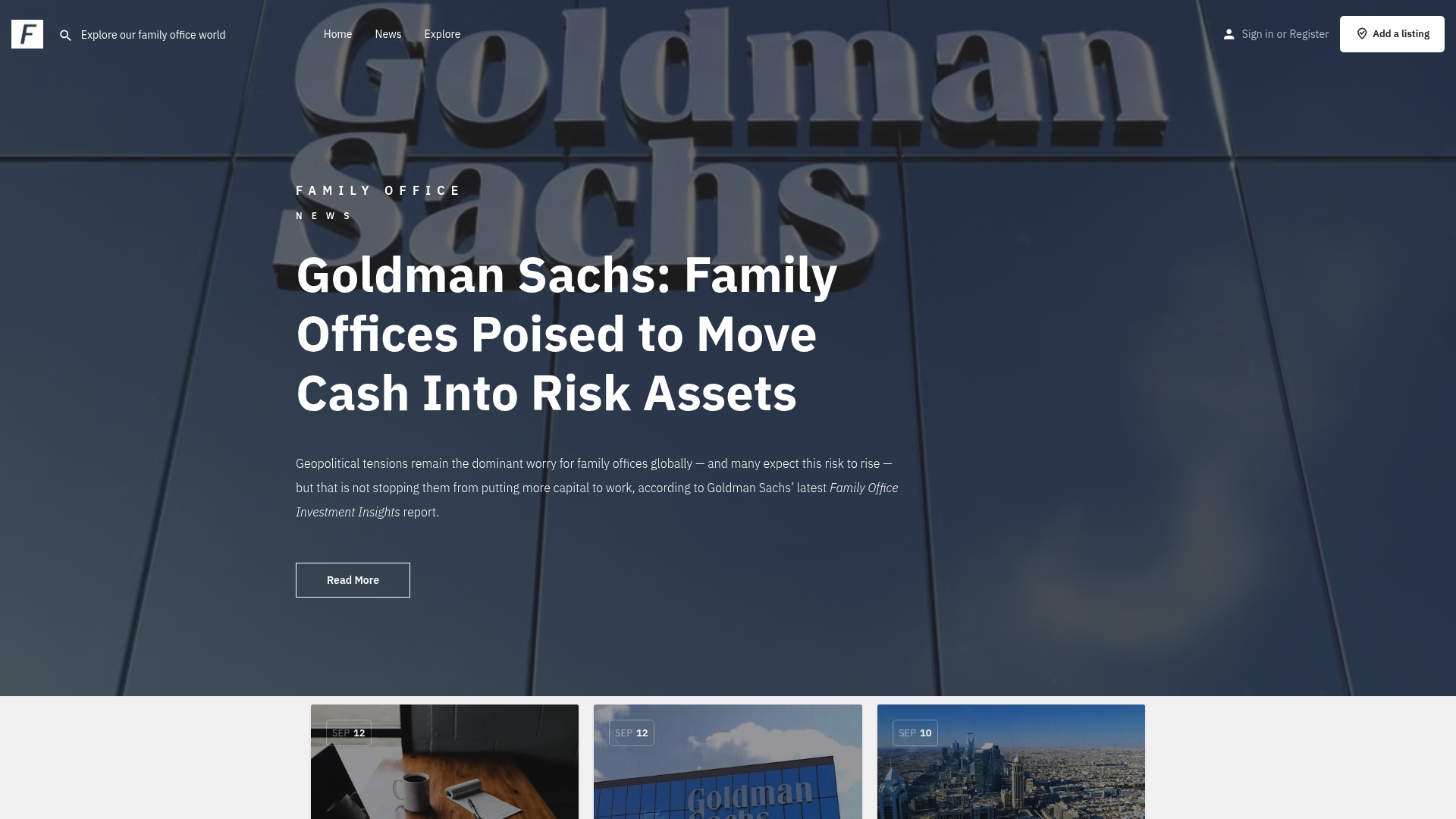High-net-worth families now manage portfolios that can include hundreds of individual investments and multiple asset classes. Facing this level of complexity, effective oversight becomes nearly impossible without reliable technology. Modern family office reporting systems consolidate vast streams of financial data into clear insights. These platforms offer a lifeline for family offices seeking to streamline multi-generational wealth management and maintain financial transparency in a rapidly evolving investment landscape.
Table of Contents
- Family Office Reporting Systems Defined And Explained
- Key Types Of Reporting Systems Compared
- Essential Features And Functional Capabilities
- Implementation, Integration, And Best Practices
- Data Security, Privacy, And Regulatory Compliance
- Common Challenges And Solutions In Reporting Systems
Key Takeaways
| Point | Details |
|---|---|
| Centralized Wealth Management | Family office reporting systems act as command centers that aggregate complex financial data for strategic decision-making across generations. |
| Diverse System Types | Systems vary in architectural models, including comprehensive enterprise systems, modular solutions, and hybrid platforms, catering to different financial management needs. |
| Integration of Advanced Technologies | The use of AI and machine learning enhances predictive insights and automates reporting tasks, increasing efficiency in financial management. |
| Focus on Data Security | Robust security measures and regulatory compliance strategies are essential to protect sensitive financial information and maintain data integrity. |
Family Office Reporting Systems Defined and Explained
A family office reporting system is a sophisticated technological infrastructure designed to comprehensively track, manage, and analyze the complex financial activities and wealth management processes of ultra-high-net-worth families. According to Wikipedia, a family office is a privately held company focused on managing investments and wealth across generations, making robust reporting systems critically important for maintaining financial transparency and strategic decision making.
These specialized reporting platforms go far beyond traditional accounting software by integrating multiple financial dimensions. They typically encompass comprehensive features such as:
- Consolidated investment portfolio tracking
- Real-time asset allocation monitoring
- Multi-currency financial reporting
- Tax planning and compliance documentation
- Detailed performance analytics
- Wealth transfer and generational planning insights
At their core, family office reporting systems serve as centralized command centers that transform complex financial data into actionable intelligence. Wikipedia notes that these systems can support not just single families but also multi-family office structures, providing scalable solutions for wealth management across different organizational models.
The evolution of these reporting systems reflects the increasing complexity of wealth management in the 21st century. Modern platforms leverage advanced technologies like artificial intelligence and machine learning to provide predictive insights, automate routine reporting tasks, and offer unprecedented levels of financial transparency. By integrating data from diverse sources—including investment accounts, real estate holdings, private equity investments, and philanthropic ventures—these systems enable family office executives to make more informed, strategic financial decisions with greater efficiency and precision.
Key Types of Reporting Systems Compared
Family office reporting systems are not one-size-fits-all solutions, but rather sophisticated platforms with distinct specialized capabilities. Private Wealth highlights that various platforms offer different approaches to data aggregation, reporting, and comprehensive financial management, making it crucial to understand the key typologies.
The primary types of family office reporting systems can be categorized into three main architectural models:
- Comprehensive Enterprise Systems: All-in-one platforms providing end-to-end wealth management capabilities
- Modular Best-of-Breed Solutions: Specialized systems that excel in specific financial reporting domains
- Hybrid Integrated Platforms: Customizable systems combining enterprise-wide functionality with targeted reporting features
Comprehensive enterprise systems represent the most holistic approach, offering integrated solutions that cover everything from investment tracking to complex financial reporting.
 These platforms typically include robust features like real-time portfolio monitoring, sophisticated analytics, compliance tracking, and detailed performance measurement across multiple asset classes and investment vehicles.
These platforms typically include robust features like real-time portfolio monitoring, sophisticated analytics, compliance tracking, and detailed performance measurement across multiple asset classes and investment vehicles.
Modular best-of-breed solutions, by contrast, allow family offices to select highly specialized reporting tools tailored to specific financial management requirements.
 These systems provide deep expertise in particular areas such as alternative investment tracking, tax optimization reporting, or global asset allocation analysis. Explore more about our guide on the family office reporting process to understand how these specialized systems can enhance financial transparency and strategic decision-making.
These systems provide deep expertise in particular areas such as alternative investment tracking, tax optimization reporting, or global asset allocation analysis. Explore more about our guide on the family office reporting process to understand how these specialized systems can enhance financial transparency and strategic decision-making.
Essential Features and Functional Capabilities
Family office reporting systems represent a complex technological ecosystem designed to deliver comprehensive financial management capabilities. FundCount emphasizes that these integrated accounting and reporting platforms provide a single database for all transactions, eliminating the need for spreadsheet reconciliation and ensuring unprecedented data accuracy across multiple financial domains.
The core functional capabilities of advanced reporting systems can be categorized into several critical dimensions:
- Investment Portfolio Management
- Real-time asset tracking
- Performance attribution analysis
- Multi-asset class consolidation
- Financial Reporting
- Customizable reporting templates
- Automated compliance documentation
- Comprehensive financial statement generation
- Risk and Compliance
- Advanced security protocols
- Regulatory monitoring
- Automated compliance alerts
These sophisticated platforms go beyond traditional accounting tools by integrating advanced technological capabilities. They leverage artificial intelligence and machine learning algorithms to provide predictive insights, automate complex financial calculations, and deliver granular performance analytics that enable family office executives to make more informed strategic decisions.
The most advanced reporting systems distinguish themselves through their ability to seamlessly integrate diverse financial data sources. From traditional investment portfolios to alternative assets like private equity, real estate holdings, and philanthropic investments, these platforms create a holistic view of family wealth. Learn more about our comprehensive family office reporting process guide to understand how these integrated systems transform raw financial data into actionable strategic intelligence.
Implementation, Integration, and Best Practices
Implementing a family office reporting system requires a strategic approach that goes beyond simple software deployment. Converge Solution emphasizes that a comprehensive reporting framework is essential for providing a consolidated view of holdings and investments, enabling effective financial planning and decision-making.
Successful implementation involves several critical stages:
-
Assessment and Planning
- Conduct a comprehensive audit of existing financial infrastructure
- Define specific reporting and performance tracking requirements
- Identify potential integration challenges
-
System Selection
- Evaluate platforms based on scalability and customization potential
- Assess data security and compliance features
- Validate compatibility with existing technological ecosystems
-
Migration and Integration
- Develop a phased migration strategy
- Ensure seamless data transfer from legacy systems
- Implement robust data validation protocols
The integration process demands meticulous attention to data architecture and interoperability. Family offices must prioritize systems that offer flexible API connections, allowing smooth communication between various financial platforms, accounting systems, and investment management tools. This approach ensures a holistic, real-time view of complex financial portfolios.
Learn more about our comprehensive family office reporting process guide to understand the nuanced strategies for implementing cutting-edge reporting systems. The most successful implementations recognize that technology is merely an enabler—the true value lies in transforming raw data into strategic financial intelligence that empowers informed decision-making across generations of wealth management.
Data Security, Privacy, and Regulatory Compliance
Data security represents the most critical consideration in family office reporting systems, where protecting ultra-sensitive financial information is paramount. Wikipedia highlights that accounting information systems are fundamentally designed to support comprehensive accounting functions while ensuring rigorous compliance with regulatory requirements and maintaining absolute data integrity.
The multilayered approach to data protection involves several critical dimensions:
-
Technological Security Measures
- Advanced encryption protocols
- Multi-factor authentication
- Continuous system monitoring
- Automated threat detection systems
-
Regulatory Compliance Strategies
- Real-time regulatory tracking
- Automated compliance reporting
- Comprehensive audit trail mechanisms
- Standardized reporting frameworks
Wikipedia notes that Standard Business Reporting programs aim to reduce regulatory burdens by defining a common language using advanced standards like XBRL, XML, and JSON, which facilitate efficient and secure data exchange across complex financial ecosystems.
The most sophisticated family office reporting systems implement a holistic approach to data governance that transcends traditional security paradigms. These platforms integrate advanced machine learning algorithms for predictive threat detection, create granular access controls, and develop dynamic compliance monitoring mechanisms that adapt to evolving regulatory landscapes. Learn more about our comprehensive family office reporting process guide to understand how cutting-edge technology transforms data protection from a technical requirement into a strategic competitive advantage for wealth management.
Common Challenges and Solutions in Reporting Systems
Family office reporting systems face a complex landscape of technological and operational challenges that require sophisticated solutions. SourceForge highlights that these software solutions must cater to diverse users, including ultra-high-net-worth individuals and family office executives, by offering comprehensive tools for investment tracking, accounting, and compliance management.
The most prevalent challenges in family office reporting can be categorized into critical domains:
-
Data Integration Challenges
- Inconsistent data formats across multiple financial platforms
- Legacy system compatibility issues
- Complex multi-asset class tracking
-
Technological Performance Barriers
- Real-time processing limitations
- Scalability constraints
- Advanced analytics implementation
-
User Experience Obstacles
- Complex interface design
- Steep learning curve for executives
- Customization complexity
Successful reporting systems overcome these challenges through innovative approaches that prioritize flexibility, interoperability, and user-centric design. Implementing advanced machine learning algorithms and developing intuitive, modular interfaces allows family offices to transform technological barriers into strategic opportunities for enhanced financial intelligence.
Learn more about our comprehensive family office reporting process guide to understand how cutting-edge technological solutions can address the multifaceted challenges inherent in modern wealth management reporting systems. The most effective platforms recognize that solving these challenges is not just about technological capability, but about creating a seamless, intelligent ecosystem that empowers financial decision-making.
Unlock the Full Potential of Your Family Office Reporting System
Managing complex wealth across generations demands not only accurate data but also clear, actionable insights. This article highlights the challenges of integrating diverse financial holdings and meeting stringent compliance requirements within family office reporting systems. If you are looking to overcome pain points such as data fragmentation, real-time portfolio monitoring, and regulatory compliance while enhancing strategic decision making, you are not alone.
Future Family Office is here to help you navigate these complexities with ease. Our platform offers a comprehensive directory of trusted family office service providers, including software solutions specialized in consolidated investment tracking and performance analytics. Connect with industry experts and explore resources tailored for ultra-high-net-worth investors and family offices ready to achieve transparency and precision.

Start transforming how your family office approaches wealth management today. Visit Future Family Office and discover expert tools and partnerships that bridge technology with strategy. Learn more about developing an effective family office reporting process that empowers your financial intelligence. Don’t wait to make the complex simple—take action now and secure your family’s legacy.
Frequently Asked Questions
What is a family office reporting system?
A family office reporting system is a technology platform designed to track, manage, and analyze the financial activities and wealth management processes of ultra-high-net-worth families, ensuring transparency and facilitating strategic decision-making.
What are the different types of family office reporting systems?
Family office reporting systems can be categorized into three main types: Comprehensive Enterprise Systems offering end-to-end solutions, Modular Best-of-Breed Solutions that focus on specific financial management needs, and Hybrid Integrated Platforms which combine features of both approaches.
What key features should I look for in a family office reporting system?
Key features to consider include investment portfolio management capabilities, customizable financial reporting, advanced risk and compliance functionalities, real-time asset tracking, and robust data security measures.
How can challenges in family office reporting systems be addressed?
Challenges can be addressed through solutions focusing on data integration, optimizing technological performance, and enhancing user experience. Utilizing machine learning, developing flexible interfaces, and ensuring interoperability among various financial platforms help to mitigate these challenges.
Recommended
- Master the Family Office Reporting Process for Accuracy – Future Family Office
- Optimize Your Family Office Investment Workflow Efficiently – Future Family Office
- How to Optimize Family Office Operations for Efficiency – Future Family Office
- How to Structure Family Governance for Lasting Impact – Future Family Office
- Cannabis Financial Reporting Guide for Full Compliance Success – Cannabis Business Minds
- Navigating the Top Five Challenges in Personal Financial Management Services: A Comprehensive Analysis – Stratgetic IT Consultants for Accountants




